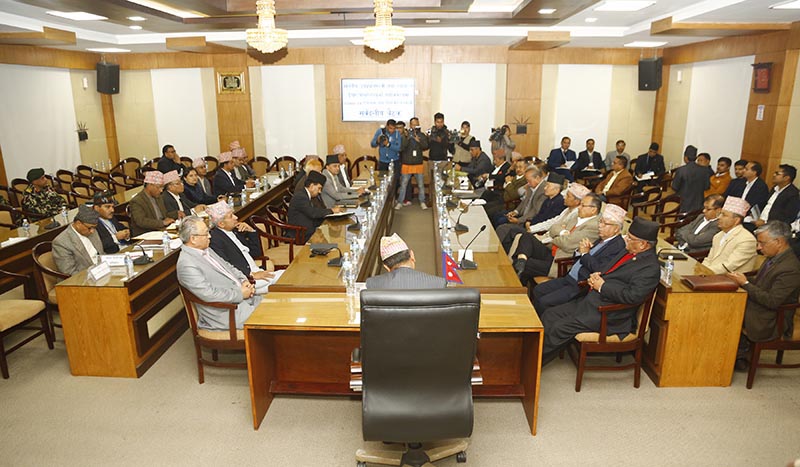Govt urged to act on war footing
Kathmandu, March 11
Both ruling and opposition leaders today urged the government to take preparedness measures against a possible COVID-19 outbreak on a war footing.
At an all-party meeting at Singha Durbar, the leaders suggested the government should take more proactive measures to ensure the country is fully prepared in case of a possible outbreak of the disease.
The all-party meeting was called by Deputy Prime Minister and Defence Minister Ishwar Pokhrel, who heads the high-level coordination committee for the prevention and control of novel coronavirus. The meeting was participated by all major leaders from both ruling and opposition parties, ministers and secretaries.
At the outset, Pokhrel sought support from all political parties for the fight against the disease. He urged all to uphold the tradition where all political parties have come together in the case of disaster or emergency.
Spokesperson for the Health Ministry Bikash Devkota then made a presentation briefing participants about the strategies adopted by the government to fight against the disease.
He said the government had adopted four strategies, with special focus on preventing the disease from entering the country.
Rest of the three strategies are related to raising awareness among the public, strengthening quarantine facilities and boosting treatment facilities for those infected.
“The government has concentrated all its efforts on not allowing the disease to enter the country by making effective checks at all entry points, such as the international airport and borders,” Devkota told THT after the meeting.
Finance, education and supplies ministers also briefed the meeting about their efforts and plans.
Minister of Education, Science and Technology Giriraj Mani Pokhrel said the government did not have any plan to shut down schools. He, however, said they would shut all schools if there was a slightest hint of heightened risk.
Minister of Industry, Commerce and Supplies Lekh Raj Bhatta said the country had enough stock of essential items and there was no need to panic. Bhatta, however, acknowledged the need to boost monitoring to curb any anomalies in the market.
Finance Minister Yubaraj Khatiwada said since Nepal did maximum economic transactions with India, which was not that affected by the disease, the economy as a whole had not faced major trouble. Acknowledging some sectors such as tourism and imports were feeling some impact, he pledged to come up with a ‘package’ in the next three days.
Although participants appreciated the government’s efforts so far, they said efforts were far from satisfactory and suggested a number of measures to be adopted.
According to Nepali Congress lawmaker Gagan Thapa, who was present at the meeting, they suggested that only seeking health certificates from people travelling in from foreign countries was not enough, and that they must be sent to self-quarantine strictly following the set protocol. The government should form an effective mechanism to monitor whether such individuals strictly followed the protocol.
In the case of land routes, participants warned that the government’s presence at border points was lax and there was need to scale up checks.
Participants also suggested that besides giving continuity to Nagarkot and Kharipati quarantines, the government should also identify other locations at the provincial level and be prepared for any worst-case scenario.
Other suggestions include ramping up hospital care facilities. The leaders suggested the government should immediately ensure insurance and incentives for front-line health workers so that there would be no shortage of human resources during an emergency.
They also suggested the government should immediately ramp up the number of ICU and isolation wards in hospitals.
There are presently 70 level-3 ICU beds in public hospitals in Kathmandu; 30 level-3 ICU beds for paediatrics; and 100 Level 2 ICU beds. In private hospitals there are 150 ICU beds. However, the alarming issue is almost all ICU beds are occupied all the time.
“Where will the people go in case of emergency? We can add 50-60 ICU beds in, say, Bir Hospital or Teaching Hospital. That will not go in vain because we already are in short supply,” said Thapa.
He added that the government must work on a war footing envisioning a situation of health emergency because it would be too late after an outbreak.
READ ALSO:






